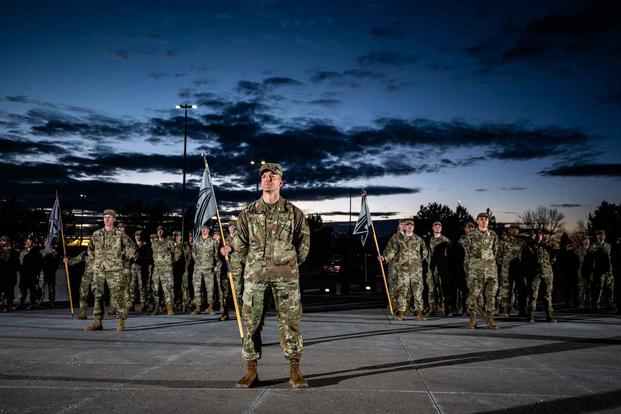The Space Force can start allowing some Guardians to choose between full-time and part-time active-duty service under a new law passed last month.
As part of the 2024 National Defense Authorization Act signed into law by President Joe Biden, the new Space Force Personnel Management Act offers active-duty Guardians and Air Force reservists working on space-related missions the option to serve either full time or part time.
The initiative was a top priority for the Space Force, which hopes to retain skilled service members tempted by higher-paying civilian jobs in at least a part-time capacity. Similarly, it could be a way to entice civilians in the private sector to consider military service.
Read Next: Navy Redesigns Its Pregnancy Policy to Give Sailors More Choice, Career Stability
The change creates a new way for the service to handle personnel management and will help it "attract, as well as recruit and retain, the top talent we need to prevail in the increasingly contested space domain," Maj. Tanya Downsworth, a Space Force spokeswoman, told Military.com in an emailed statement.
The Space Force, created in 2019, now has nearly 9,000 Guardians, but has never had a reserve or National Guard component like the other military branches.
Several ideas to establish either a part-time service model or even a Space National Guard were stymied by the White House and Congress over the last two years. The Space Force Personnel Management Act represents the first legislative breakthrough, but more work to figure out the particulars remains.
Under active status, Guardians can be on sustained duty or "not on sustained duty." Sustained duty is normal full-time, active-duty status.
"Not on sustained duty," or part time, requires Guardians to "participate in at least 48 scheduled drills or training periods during each year and serve on active duty for not less than 14 days (exclusive of travel time) during each year; or serve on active duty for not more than 30 days during each year," according to the NDAA text.
There is also inactive status, which would be comparable to Individual Ready Reserve status in the Air Force, in which a service member does not receive pay and does not drill unless called upon to do so or they volunteer to return to the active-duty force.
What the new structure could mean for the 1,000 National Guard soldiers and airmen who do space-related missions is still being ironed out. The Space Guard plan has drawn opposition from critics, as well as the White House, over the years stating that the tiny service branch doesn't need the extra cost or logistical complications that come with creating a new Guard force.
The NDAA asks the Pentagon to "conduct an independent study to assess the feasibility and advisability of moving all units, personnel billets, equipment, and resources performing core space functions under the operational control of the Space Force, or otherwise integral to the Space Force mission that may exist in the National Guard … into a single-component Space Force," the law states. That report is due by Feb.1, 2025.
Brig. Gen. Mike Bruno, chair of the space task force at the National Guard Association of the United States, said in an interview with the Federal News Network on Thursday that he believes that a Space National Guard could be useful.
"We think that they can do both at the same time. So, the Space Force Personnel Management Act is pretty much encompassing the reserve status of having a Space Force reserve. ... But you could also have a Space National Guard, which would be your surge to war capability," Bruno told the outlet. "And that's our hope, is that's what happens."
Downsworth said it will take several years to figure out additional details of the policy.
"The Space Force Management Act proposal included a multi-year transition period to allow the Department of the Air Force and Department of Defense to publish implementing policies and ensure the necessary systems are in place for personnel," Downsworth said. "All transfers from the Air Force Reserve will be voluntary."
The Space Force and Marine Corps were the only two service branches who met their enlistment recruiting goals last fiscal year.
Downsworth added that the new structure will also help improve quality of life for Guardians.
"When fully implemented, this new construct will allow us to manage our military force more effectively, improve quality of life and retention, and capitalize on skill sets developed outside the military to continue delivering unmatched space capabilities," she said in a statement.
Related: Space Force Could Get a Guard Force and Part-Time Guardians, If House Lawmakers Get Their Way















